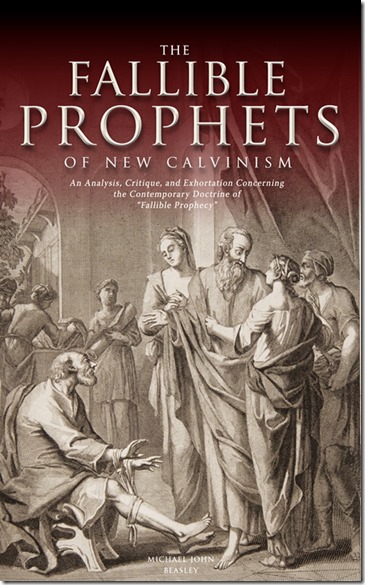
Posted on 11/25/2013 9:44:04 AM PST by fishtank
Thursday, November 14, 2013
The Fallible Prophets of New Calvinism
by Michael John Beasley
From the website: This book examines Dr. Wayne Grudem's controversial teaching on fallible prophecy in view of various lexical, exegetical, and historical points of analysis. It also addresses the teaching's popularity and continuing advancement through many charismatics within the "New Calvinism" movement. The doctrine of fallible prophecy is neither benign nor harmless, rather it constitutes a troubling strange fire for the body of Christ and continues to spread through the advocacy of popular continuationists like Wayne Grudem, D.A. Carson, John Piper, and Mark Driscoll:
1. Chapter 1: Prophecy – A Test of Love: According to the proponents of fallible prophecy, the presence of error in a prophetic utterance does not make such claimants of the prophetic gift false prophets, it only means that they are New Testament fallible prophets by definition. This constitutes a complete reversal of meaning of prophecy which results in a confused message concerning the nature and character of the God who has consistently and effectually revealed Himself through His appointed messengers. Moreover, such a redaction of prophecy effectively confuses, and nearly eliminates, the scripturally prescribed tests for prophecy. The importance of this must not be underestimated, for all of the tests of prophecy, in the Old Testament and the New Testament, have an unimpeachable centerpiece: the love of God.
2. Chapter 2: Fallible prophecy – Lexical Considerations: Grudem argues that the New Testament connotation of the word prophet no longer possessed the sense of authority it once had. Thus, Christ did not call his disciples prophets because “…the Greek word prophetes (‘prophet’) at the time of the New Testament…did not have the sense ‘one who speaks God’s very words’.” In view of Grudem’s emphasis on this point, it will be very important for us to examine his lexical justification for such a conclusion.
3. Chapter 3: Fallible prophecy – The Case of Agabus: Grudem argues that genuine NT prophets could be resisted in view of their fallibility based upon texts like 1 Cor. 14:29. In support of this view, Grudem supplies examples of what he believes are NT fallible prophets, the most central of which is Agabus. Like Grudem, D.A. Carson insists that Agabus’ prophecy was fraught with error, saying, "I can think of no reported Old Testament prophet whose prophecies are so wrong on the details." This is a very serious accusation requiring a thorough investigation.
4. Chapter 4: Fallible prophecy – A Gift for All?: Grudem argues that, unlike the unique gift of prophecy given in the time of the OT, the NT gift of prophecy was extremely common and functioned “in thousands of ordinary Christians in hundreds of local churches at the time of the New Testament.” He also argues that neither grave error nor immaturity should serve as a barrier to the pursuit and exercise of such a gift by nearly everyone within the local church. Such thinking is a tragedy for the body of Christ which is called to holiness and truth in all aspects of life and servitude.
5. Conclusion: The Fallible Prophets of New Calvinism: Believing in the value and efficacy of fallible prophecy, a growing number of popular pastors and teachers are now openly promoting such teaching. Particularly within the increasingly popular New Calvinism movement we find a growing number of advocates of fallible prophecy. To facilitate the spread of this doctrine, Grudem himself supplies a 6-point strategy for establishing fallible prophecy within the local church. This poses an increasing danger of the tolerance and proliferation of false prophets within the church.
BuzzNet Tags: fallible prophecy,wayne grudem,john piper,d.a. carson,charismata,charismatic,continuationism,cessationism

Has anyone here read this yet?
I was doing an AMazon search on Wayne Grudem, and this popped up.
p.s. This also relates to Wayne Grudem’s teachings and beliefs that were a subject of discussion at John MacArthur’s “Strange Fire” conference.
the artwork seems to be a painting of Agabus....
Wher was Agabus in error, exactly?
I’m not sure.....
I just saw this yesterday.... not much time since then to look into it.
Artwork ...
“Agabus’s prophesy
concerning Paul
by Gerard Hoet, 1728”
News to me. Ping for later
Thanks for posting this. I do not follow this closely but am wondering if this means there is a parting of ways between preacher / theologians like John MacArthur and John Piper. I know they both identify as Calvinistic and have worked together in the past.
I would like to learn more about traditional Calvinistic theology and writings as I have found many proponents of this view do not seem to line up with scripture. However, I never heard MacArthur or Piper promoting these particular errors though they identify as Calvinistic. My study has been limited to the Bible on these topics. I have wondered for a long time if the problem is that some of Calvin’s views are being misrepresented or misunderstood.
Wish I had more time to explore and study this.
I started watching Strange Fire messages from John McArthur, but after the 4th, I was done. It has become more legalism. Not only that, but he brushes EVERY single so-called charismatic church with the same brush of error. It’s just not so. Some of his tenets directly contradicted what Paul said in I Corinthians. While I do believe we can put too much emphasis on the gifts and not the Giver, I do believe that God does use those gifts today in places where the Gospel is beginning to make inroads. (3rd world countries, etc.) It validates the Biblical record. While I agree that so much of what we see today IS ERROR, outright and easy to prove Biblically, I feel that one cannot totally deny the gifts. What we see in American charismatic churches, for the most part, is error. But there are some good churches who have kept their doctrine pure and they are good Bereans...examining the Scriptures to see if a doctrine be false or True. You cannot call ALL charismatic churches false.
hmmmm.... I agree, too.
Here’s my summary of the SF conference: The teaching was good and accurate.
The application, not so. For example, there was a denigration of modern worship music (i.e. “we’re hymn people” attitude).
Also, there was a criticism by MacArthur of Chuck SMith and Calvary Chapel since they allowed “hippies” to come to church and wear T-shirts and sandals.
MacArthur did a great job teaching, then threw out some very childish applications.
My $0.02.
BUT BUT BUT, I will be much more bold in denouncing the ERROR in the ‘Flamin’ Strangers’.....
... they are as bad or worse than the lds in their error (i.e. Copeland, Capps, Dollar, Hinn, Osteen, etc. etc.).
All Biblical prophets but Jesus were fallible
I would guess that if someone read mostly the Bible, then they read Calvin’s Institutes, they’d see a certain difference.
Then, if another person reads mostly the Institutes and let’s say ten more theologians, and a lesser amount of the Bible, there would be even more noticed differences.
I looked on Amazon for Calvin’s Institutes on Kindle and found there are selections for under $1. Can’t beat that.
I am downloading a sample to peruse. Perhaps I will find time to read the whole work over the coming months.
Here’s my personal view: the God who revealed Himself to the Hebrews and who sacrificed His son to save the world is NOT the God of Calvin.
Ummm, John Calvin was a born again believer in Christ.
He wasn’t perfect, but I’m sure I’ll see him in heaven.
No. God gave requirements for the truthfulness of prophets.
If God was truly speaking through them, their prophecies from God were 100% accurate.
Do you rememeber the scripture verse about that?
Only the prophecies from God were perfect, the people themselves were still very fallible and many of the prophets would displease God and lead sinful lives.
Dear fishtank - I saw your posting and wanted to offer a few details concerning your inquiry. First of all, the expression “New Calvinism” represents a new and growing movement that is mostly populated (though not exclusively) by those who are continuationist/charismatic in their understanding of the “sign gifts,” i.e., tongues, prophecy, gifts of healing etc. This particular book examines the question as to whether the church still has prophets who speak divine revelation in the modern day. The advocates of “fallible prophecy” would argue that we do have prophets in the modern day - but that they are fallible in their proclamations, unlike the prophets of the Old Testament era. Thus, the historic tests for prophetic veracity and infallibility (Deut. 13:1-5 & 18:20-22) do not apply to the NT prophets of the modern day according to the advocates of fallible prophecy. Thus, a modern “fallible prophet” might approach other Christians and utter their “revelation” from God, but it will be fraught with corruption and error - however, the supposed “prophet” is still considered to be valid. As a part of their position, the advocates of FP argue that the prophet Agabus was in error when he uttered his prophecy in Acts 21:11. Such an accusation is entirely new within the span of church history, but it is central for the contemporary doctrine of “fallible prophecy.” The destructive potential that comes with such an innovation of the doctrine of prophecy is difficult to estimate, but the book addresses some of the concerns which attend the philosophy of fallible prophecy. I hope that this helps in some manner -
We will keep the book at amazon’s lowest available price ($0.99) for some time - we simply want people to get exposure to this crucial and troubling issue. As well, here is a link to a free sample to the book:
http://www.thearmouryministries.org/tfponc.html
Blessings in Christ
mjbeasley

Disclaimer: Opinions posted on Free Republic are those of the individual posters and do not necessarily represent the opinion of Free Republic or its management. All materials posted herein are protected by copyright law and the exemption for fair use of copyrighted works.